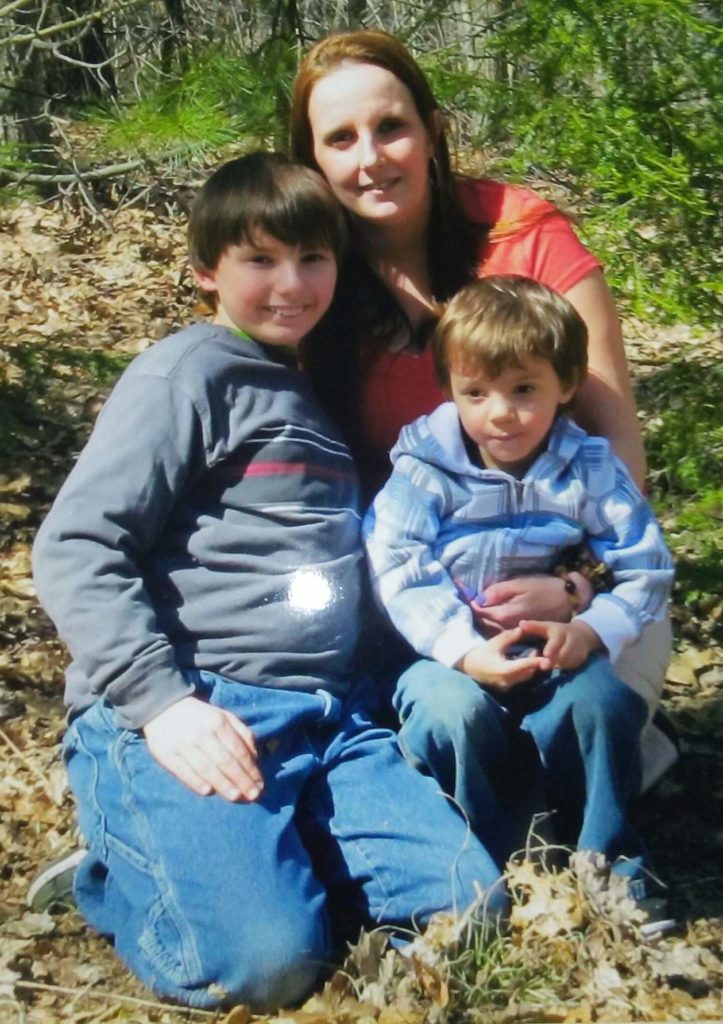
Jessica DiCesare and her two sons, now 15 and 7 years old
What happened to 35-year-old Jessica DiCesare last year? On July 8, 2017, Jessica DiCesare, mother of two, was “found” dead in her cell in the Barnstable County Correctional Facility, in Buzzards Bay, Massachusetts. The investigation officer found a note, which read, in part, “This place is so fucked … this is not justice, nor innocent until proven guilty, nor `good for the common wealth’. We are treated like sub-animals here …. I’m losing my mind / I want to die.” On July 7, following a panic attack, Jessica DiCesare wrote a note to the jail staff, which read, in part, “Being in segregation is deteriorating my mental status, as well as my physical health. I have no prior convictions, no prior jail time, and was placed here almost one month ago. I have PTSD … Being locked in here is bringing my mental health status back 10 years … also having been taken off my meds I have been on. I went from running a successful business to mental deterioration because of being locked up 23 hours a day … I also suffer major depression, bipolar disorder, prior hospitalizations for suicidal feelings and am losing my mind in here.” Am losing my mind in here. Despite the pleas from a social worker who had read the note, the supervisor of mental health clinicians decided that DiCesare did not require any special attention. What happened to Jessica DiCesare? The routine torture of women in jails in Massachusetts and across the United States. On July 11, 2017, Jessica DiCesare was pronounced dead.
Jessica DiCesare was initially picked up for drug and theft charges. Her bail was set at $500. Her mother, Sue DiCesare, and brother, Richard DiCesare decided not to pay. Since high school, Jessica DiCesare had struggled with substance abuse and mental illness. Mother and brother both thought Jessica DiCesare would be safer and maybe get some help while in jail awaiting trial. Now, Sue DiCesare says, “The guilt we feel for not bailing her out is huge.”
From schools to streets to courts to jails and prison, everyone who comes into contact with the aptly named criminal justice system is meant to struggle with this guilt. It’s an additional fee levied on “those who chose”, chose to be poor or of color or immigrant or woman or LGBTIQ or living with mental illness or living with drug addiction. Those who “made poor choices” carry an impossible debt they never incurred. You know who doesn’t feel huge guilt. The medical supervisor at Barnstable County Correctional Facility, who insisted that Jessica DiCesare did not warrant special attention.
And so now, jail officials intone their version of “prayers and thoughts”, namely that jail is not designed to be a mental health institution nor an addiction treatment facility . “Every suicide is a tragedy.” How long before the individual tragedies are seen, collectively, as an epidemic? At what point do we recognize that jail is the public health crisis? When do Sue and Richard DiCesare stop being made to feel guilty?
In 2017, fourteen people died of suicide in Massachusetts’ prisons and jails, the highest number since the last peak, in 2014. Of the 14, 4 were in Massachusetts prisons and 10 were in Massachusetts jails, where prisoners include people awaiting trial and people sentenced to up to 2 ½ years. Massachusetts houses about 20,000 people in jails and prisons, with about 10,000 in each. Three weeks prior to Jessica DiCesare’s death, 21-year-old William Jarosiewicz “was found dead” in his cell at the same Barnstable County Correctional Facility. Jessica DiCesare joins the circle of Tanna Jo Fillmore, Madison Jensen, Madaline Christine Pitkin, Sarah Lee Circle Bear, Christina Tahhahwah, Amy Lynn Cowling, Ashley Ellis, Kellsie Green, Joyce Curnell, Sandra Bland, Kindra Chapman, Kellsie Green and so many other women who have “been found” in America’s jails. Jessica DiCesare begged for help; her family pleaded for help. When did asking for help become a death sentence?
(Photo Credit: Cape Cod Times)